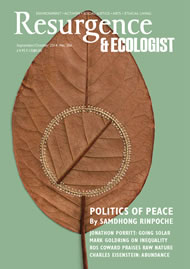In this, the centenary year of World War I, the war that was to end all wars, it is clear to all that that slogan was completely false. The hope of peace was soon shattered. World War I became the precursor of World War II, which led to the Cold War and many other wars. Wars are never about peace. They are about conquering and control. Wars don’t end wars: wars beget wars.
While ordinary people around the world hunger for peace, political and military leaders and the arms traders seem to have unshakable faith that it is wars that will bring peace. They ignore the long history of their failures and continue to prepare for wars in the name of ‘national interest’, ‘homeland security’ and ‘territorial integrity’. But all these goals remain elusive. We live under the tyranny of perpetual fear. And freedom from fear is a prerequisite for peace.
The century of war also witnessed the power of peace. At the time of World War I there was a strong people’s peace movement in Britain led by writers such as Sylvia Pankhurst and philosophers like Bertrand Russell. 20,000 British men of military age refused to join the army, and 6,000 of them went to prison. Ever since, promoters of peace have been reminding the world that an eye for an eye makes the whole world blind. People like Mahatma Gandhi, Martin Luther King and Mother Teresa showed that another way is possible.
The 21st of September is the United Nations International Day of Peace, celebrated around the globe. This day reminds us of the simple and self-evident truth that war and violence are futile. In this issue of Resurgence & Ecologist, as a contribution to the International Day of Peace and reflecting on the 8,000-mile peace walk I took with E.P. Menon 50 years ago, which was possible only because of the generosity, trust and longing for peace of so many ordinary people who fed, housed and guided us, I offer an essay on the power of nonviolence.
The 2nd of October 2014 marks the 145th anniversary of the birth of Mahatma Gandhi, one of the greatest champions of peace and nonviolence. In gratitude to Gandhi, we present a talk by Samdhong Rinpoche, former Prime Minister of the Tibetan government in exile, on Gandhi’s spiritual values and the politics of peace.
There appears to be a change in the air. At least some politicians are beginning to notice that people are sick and tired of wars. Tony Blair has lost most of his prestige and credibility because of his role in the Iraq war. So has George Bush. Not much good has come out of these wars. The slaughter of the innocent continues apace. Even though President Obama has been a great disappointment to many, he is trying to reduce US involvement in international warfare. The US congress and the British parliament have refused to endorse the military involvement in Syria. The situation in Ukraine is far from good, and the two sides continue to attack each other, but at least neither Russia nor the Western powers are rushing into a military conflict. Although peace is not yet winning there, war doesn’t seem to be the preferred option.
The optimist in me would like to think that wars and conflicts may be a thing of the past. But unfortunately peace is not in the interest of arms traders and military leaders. Wouldn’t it be wonderful if merchants of arms were to shift their focus and become the manufacturers of solar panels, as advocated by Jonathon Porritt in this issue?
All this may sound meek and naive, but Jesus said: “Blessed are the meek: for they shall inherit the earth.” In spite of the clouds of conflict darkening the human sky, I hold on to my faith in the enduring human spirit.








